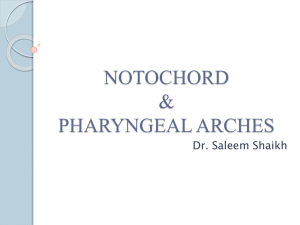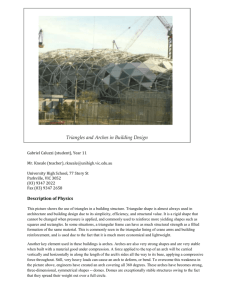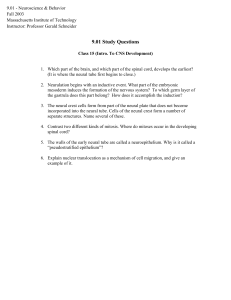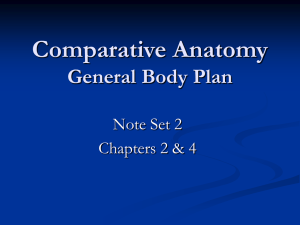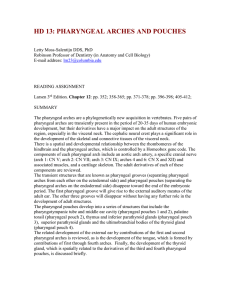Pharyngeal arches L.Moss-Salentijn
advertisement
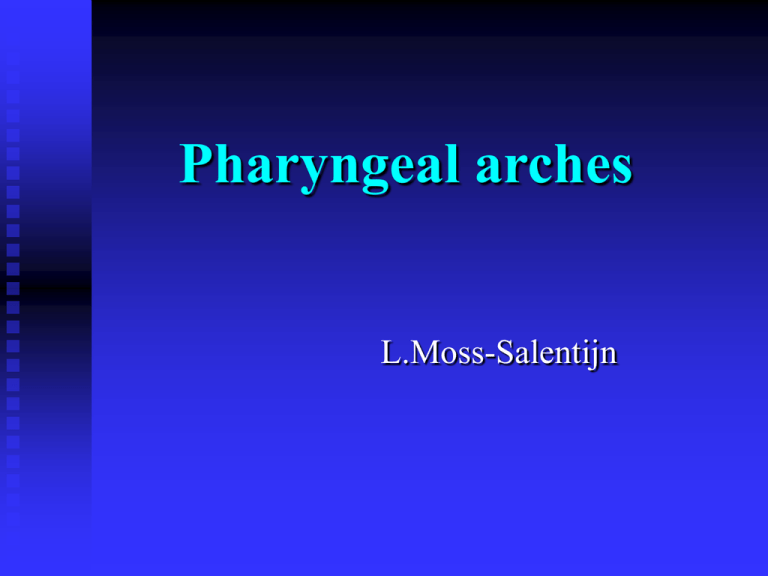
Pharyngeal arches L.Moss-Salentijn Pharyngeal arches: a definition A segmental series of five paired swellings that surround the foregut between days 20 to 35 of embryonic development. These segments, which are unique to vertebrates, are “wedged” between the developing forebrain and heart. Pharyngeal arches a.k.a. visceral or branchial arches Develop (and disappear as distinctively visible structures) in a rostro-caudal sequence Require neural crest cells for their development Even after they are no longer visible externally, they have a lasting impact on the anatomy of the head and neck and of the great vessels 5 Pharyngeal arches 5 Aortic arches Arches numbered 1-6 Arches, grooves, pouches, and membranes Pharyngeal groove Pharyngeal pouch Pharyngeal arch Foregut Pharyngeal membrane Pharyngeal cleft transient “gill-slit” Phylogeny of early deuterostomes Pharyngeal arches are unique to vertebrates (subphylum of chordates) Sedentary Passive, filter-feeding Basic body plan of all chordates (incl. vertebrates) Dorsal hollow neural tube Segmented lateral mesoderm Central notochord Ventral digestive tube (Pharyngeal gill slits) Evolution of vertebrates involved: Development of organs of special sense in head region to detect prey Development of a large neural circuitry (the brain) to integrate input and responses Development of an effective feeding apparatus (jaws: pharyngeal arch derivatives) Development of an improved respiratory apparatus (gills: pharyngeal arch derivatives). This required the recruitment of an existing group of cells: neural crest cells, for a new role. Jawless fishes - lampreys Mesenchyme in cephalic region derived from: Mesoderm Neural crest Cephalic mesoderm Prechordal plate origin ? Somitomeres, not somites Somitomeres Somitogenesis Cephalic somitomeres Neural crest migration Cephalic neural crest migration Neural crest and mesoderm in H&N area Neural crest in pharyngeal arches NC derivatives Neural crest involvement in the development of teeth Extent of cephalic (cranial) neural crest Neural crest involvement in the development of the heart Neural crest cell contribution to the early development of the truncoconal septum Arch segmentation and rhombomeres Expression of homeotic genes Segmental components of arches Connective tissues - nc Muscle – mesoderm Branchiomeric nerve – nc,ectoderm,neurectoderm Skeletal bar- nc (cartilage) last to form Artery – mesodermfirst to appear Aortic arch development Aortic arch development cont’d Branchiomeric nerves: rhombomeric origins Branchiomeric nerves : preand posttrematic rami Dual afferent innervation in each arch Muscles Arch 1: Muscles of mastication (V) Arch 2: Muscles of facial expression (VII) Arch 3: Stylopharyngeus muscle (IX) Arch 4-6: Laryngeal muscles (X-XI) Skeletal elements Skeletal derivatives
